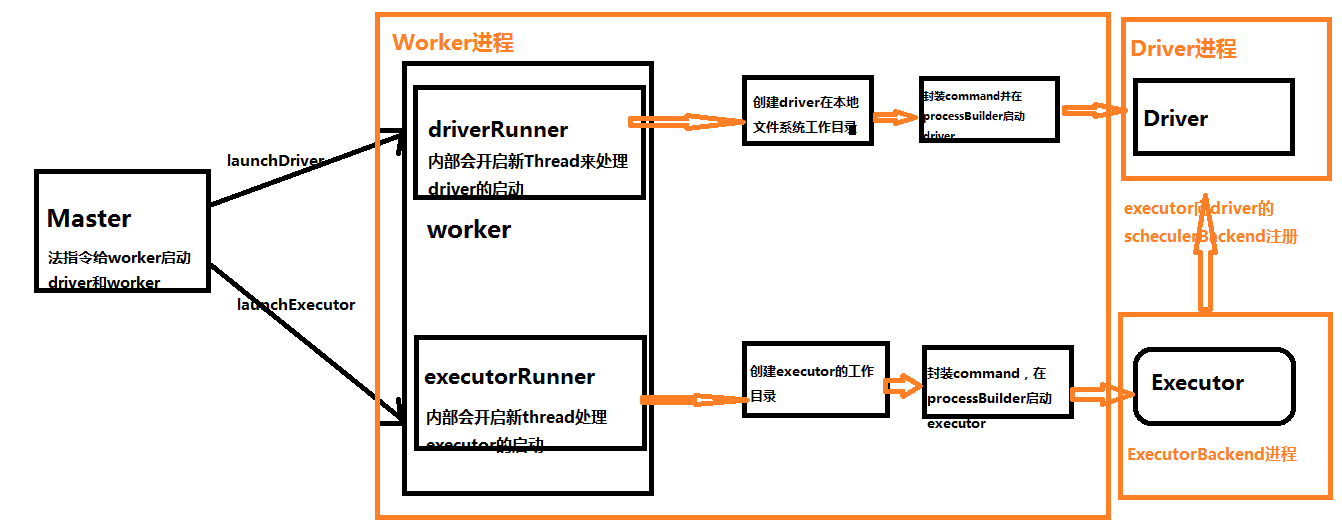
二:Spark Worker启动Driver源码解析
case LaunchDriver(driverId, driverDesc) => {
logInfo(s"Asked to launch driver $driverId")
val driver = new DriverRunner(//代理模式启动Driver
conf,
driverId,
workDir,
sparkHome,
driverDesc.copy(command = Worker.maybeUpdateSSLSettings(driverDesc.command, conf)),
self,
workerUri,
securityMgr)
drivers(driverId) = driver//将生成的DriverRunner对象按照driverId放到drivers数组中,这里面存放的HashMap的键值对,键为driverId,值为DriverRunner对象,用来标识当前的DriverRunner对象
driver.start()
//driver启动之后,将使用的cores和内存记录起来。
coresUsed += driverDesc.cores
memoryUsed += driverDesc.mem
}
补充说明:如果Cluster上的driver启动失败或者崩溃的时候,如果driverDescription的supervise设置的为true的时候,会自动重启,由worker负责它的重新启动。
DriverRunner对象
private[deploy] class DriverRunner(
conf: SparkConf,
val driverId: String,
val workDir: File,
val sparkHome: File,
val driverDesc: DriverDescription,
val worker: RpcEndpointRef,
val workerUrl: String,
val securityManager: SecurityManager)
extends Logging {
DriverRunner的构造方法,包括driver启动时的一些配置信息。这个类中封装了一个start方法,开启新的线程来启动driver
/** Starts a thread to run and manage the driver. */
private[worker] def start() = {
new Thread("DriverRunner for " + driverId) {//使用java的线程代码开启新线程来启动driver
override def run() {
try {
val driverDir = createWorkingDirectory()//创建driver工作目录
val localJarFilename = downloadUserJar(driverDir)//从hdfs上下载用户的jar包依赖(用户把jar提交给集群,会存储在hdfs上)
def substituteVariables(argument: String): String = argument match {
case "{{WORKER_URL}}" => workerUrl
case "{{USER_JAR}}" => localJarFilename
case other => other
}
// TODO: If we add ability to submit multiple jars they should also be added here
val builder = CommandUtils.buildProcessBuilder(driverDesc.command, securityManager,//如通过processBuilder来launchDriver
driverDesc.mem, sparkHome.getAbsolutePath, substituteVariables)
launchDriver(builder, driverDir, driverDesc.supervise)
}
catch {
case e: Exception => finalException = Some(e)
}
val state =
if (killed) {
DriverState.KILLED
} else if (finalException.isDefined) {
DriverState.ERROR
} else {
finalExitCode match {
case Some(0) => DriverState.FINISHED
case _ => DriverState.FAILED
}
}
finalState = Some(state)
worker.send(DriverStateChanged(driverId, state, finalException))//启动发生异常会向worker发消息。
}
}.start()
}
可以看出在run方法中会创建driver的工作目录
/**
* Creates the working directory for this driver.
* Will throw an exception if there are errors preparing the directory.
*/
private def createWorkingDirectory(): File = {
val driverDir = new File(workDir, driverId)
if (!driverDir.exists() && !driverDir.mkdirs()) {
throw new IOException("Failed to create directory " + driverDir)
}
driverDir
}
接下来会通过processBuilder来launchDriver
def buildProcessBuilder(
command: Command,
securityMgr: SecurityManager,
memory: Int,
sparkHome: String,
substituteArguments: String => String,
classPaths: Seq[String] = Seq[String](),
env: Map[String, String] = sys.env): ProcessBuilder = {
val localCommand = buildLocalCommand(
command, securityMgr, substituteArguments, classPaths, env)
val commandSeq = buildCommandSeq(localCommand, memory, sparkHome)
val builder = new ProcessBuilder(commandSeq: _*)
val environment = builder.environment()
for ((key, value) <- localCommand.environment) {
environment.put(key, value)
}
builder
}
剩下的就是异常处理了,这部分就是java的异常处理机制。需要说明的是如果启动失败,会发消息给worker和master。通知driver状态发生了改变。
case class DriverStateChanged(
driverId: String,
state: DriverState,
exception: Option[Exception])
extends DeployMessage
三:Worker启动Executor源码解析
Worker启动Executor的过程跟启动Driver基本一致,从本质上来说,Driver就是Worker上的一个Executor(当然是指Cluster模式)。这里就附上源码,不在展开了
case LaunchExecutor(masterUrl, appId, execId, appDesc, cores_, memory_) =>
if (masterUrl != activeMasterUrl) {
logWarning("Invalid Master (" + masterUrl + ") attempted to launch executor.")
} else {
try {
logInfo("Asked to launch executor %s/%d for %s".format(appId, execId, appDesc.name))
// Create the executor's working directory
val executorDir = new File(workDir, appId + "/" + execId)
if (!executorDir.mkdirs()) {
throw new IOException("Failed to create directory " + executorDir)
}
// Create local dirs for the executor. These are passed to the executor via the
// SPARK_EXECUTOR_DIRS environment variable, and deleted by the Worker when the
// application finishes.
val appLocalDirs = appDirectories.get(appId).getOrElse {
Utils.getOrCreateLocalRootDirs(conf).map { dir =>
val appDir = Utils.createDirectory(dir, namePrefix = "executor")
Utils.chmod700(appDir)
appDir.getAbsolutePath()
}.toSeq
}
appDirectories(appId) = appLocalDirs
val manager = new ExecutorRunner(
appId,
execId,
appDesc.copy(command = Worker.maybeUpdateSSLSettings(appDesc.command, conf)),
cores_,
memory_,
self,
workerId,
host,
webUi.boundPort,
publicAddress,
sparkHome,
executorDir,
workerUri,
conf,
appLocalDirs, ExecutorState.RUNNING)
executors(appId + "/" + execId) = manager
manager.start()
coresUsed += cores_
memoryUsed += memory_
sendToMaster(ExecutorStateChanged(appId, execId, manager.state, None, None))
} catch {
case e: Exception => {
logError(s"Failed to launch executor $appId/$execId for ${appDesc.name}.", e)
if (executors.contains(appId + "/" + execId)) {
executors(appId + "/" + execId).kill()
executors -= appId + "/" + execId
}
sendToMaster(ExecutorStateChanged(appId, execId, ExecutorState.FAILED,
Some(e.toString), None))
}
}
}